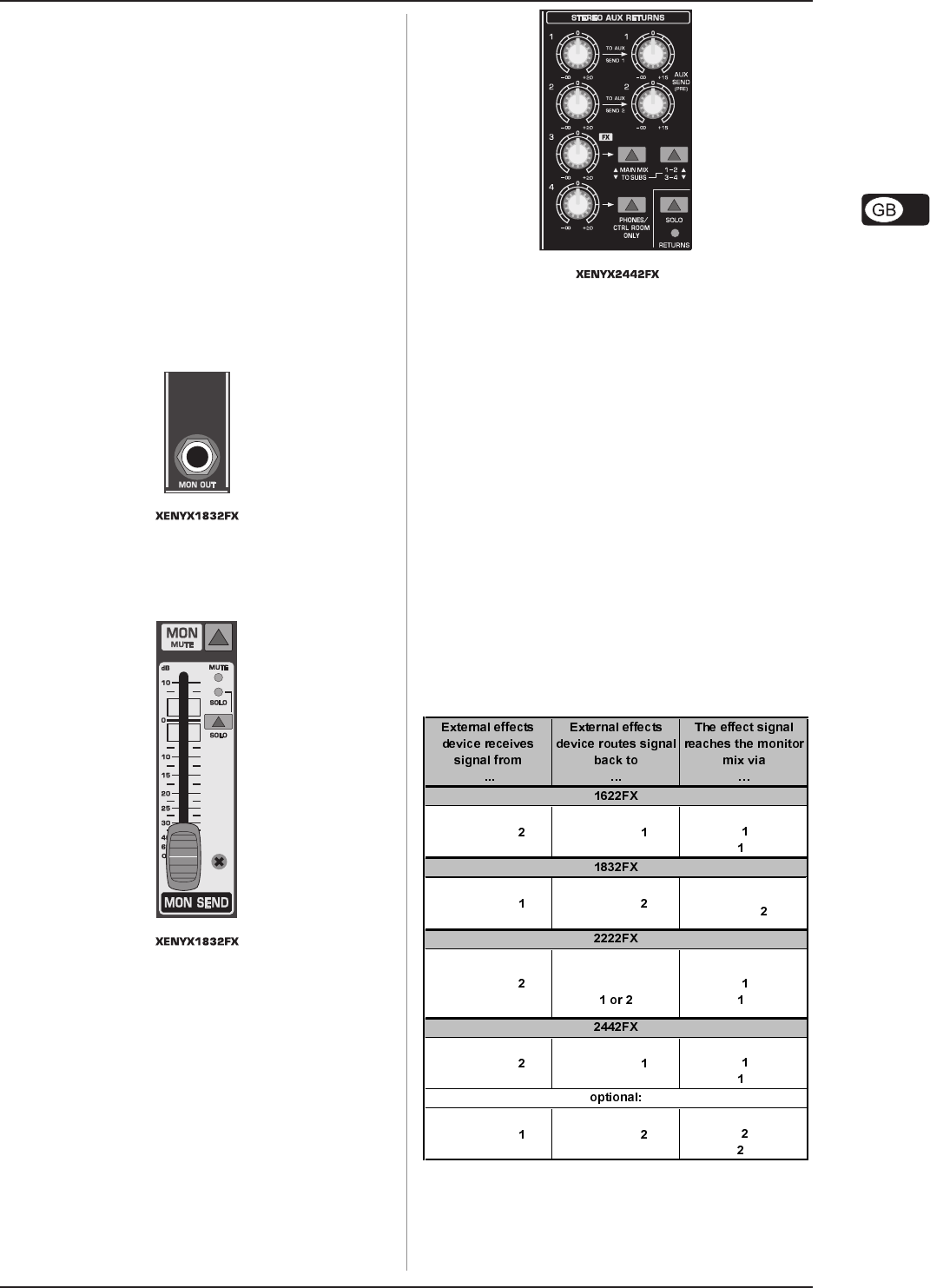
9
XENYX 1622FX/1832FX/2222FX/2442FX
return (created using the channel FX sends). If these jacks are
already in use as additional inputs, you can route the effects
signal back into the console via a different channel. The advantage
of this is that you can now use that channels EQ on the effects
return signal.
+ In this instance, the FX control of the channel being
used as an effects return should be turned fully
counterclockwise, otherwise feedback problems
could occur!
+ If you wish to use the internal effects processor,
do not plug any connectors into the STEREO AUX
RETURN FX jacks, unless you want to tap the
processed signal via the FX OUT (2222FX and 2442FX
only).
2.3.4 The monitor section of the 1832FX
One of the ways that the 1832FX differs from the other models
of this series is that it has a separate monitor output.
Fig. 2.10: Monitor output of the 1832FX
The first aux send (MON) on this console is used to set up the
monitor mix from the channels and route it to the MON SEND
fader.
Fig. 2.11: Monitor fader of the 1832FX
MUTE
Press the MUTE switch to mute the monitor send.
SOLO
The SOLO switch routes the monitor send to the solo bus
(post-fader and post-mute) or to the PFL bus (pre-fader and
pre-mute). The position of the MODE switch in the main section
determines which of the buses is selected.
2.3.5 Stereo aux return control
STEREO AUX RETURN 1
The STEREO AUX RETURN 1 control determines the level of
this signal in the main mix. If STEREO AUX RETURN 1 is used as
effects return, this will determine the level of the effects when
mixed with any dry channel signal.
+ When used in this way, the effects device should
be set at 100% effect.
Fig. 2.12: Stereo aux return and
stereo aux return (to aux send) controls
STEREO AUX RETURN 1/2 (TO AUX SEND)
The two right-hand STEREO AUX RETURN controls have a
special function: they can be used to add an effect to a monitor
mix. An example follows (1622FX wired to an effects device):
Monitor mix with effect
In this instance, your effects device should be set up as follows:
the AUX SEND 2 jack should be connected to the L/Mono input of
your effects device, with its outputs coming back into the STEREO
AUX RETURN 1 jacks.
Connect the AUX SEND 1 jack output to the amplifier of your
monitor system. The AUX SEND 1 master control determines the
overall volume of the monitor mix.
Using the STEREO AUX RETURN (TO AUX SEND) control, the
effect signal can now be blended into the monitor mix.
You can easily use the headphones distribution amplifier
BEHRINGER POWERPLAY PRO HA4700/HA8000 to provide four
(HA8000: eight) stereo headphone mixes for your studio.
The following table shows which jacks on the console can be
used for this purpose.
AUX SEND
STEREO AUX
RETURN
connectors
STEREO AUX
RETURN
(TO AUX
SEND ) control
AUX SEND
STEREO AUX
RETURN
connectors
MONITOR switch o
f
the FX/AUX RET
AUX SEND
STEREO AUX
RETURN connectors
STEREO AUX
RETURN
(TO AUX
SEND ) control
AUX SEND
STEREO AUX
RETURN
connectors
STEREO AUX
RETURN
(TO AUX
SEND ) control
AUX SEND
STEREO AUX
RETURN
connectors
STEREO AUX
RETURN
(TO AUX
SEND ) control
Tab. 2.1: Connectors and controls for monitor mix with effect
STEREO AUX RETURN FX
On consoles 1622FX and 1832FX this is the STEREO AUX
RETURN 2, on consoles 2222FX and 2442FX this is the STEREO
AUX RETURN 3.
2. CONTROL ELEMENTS AND CONNECTORS


















